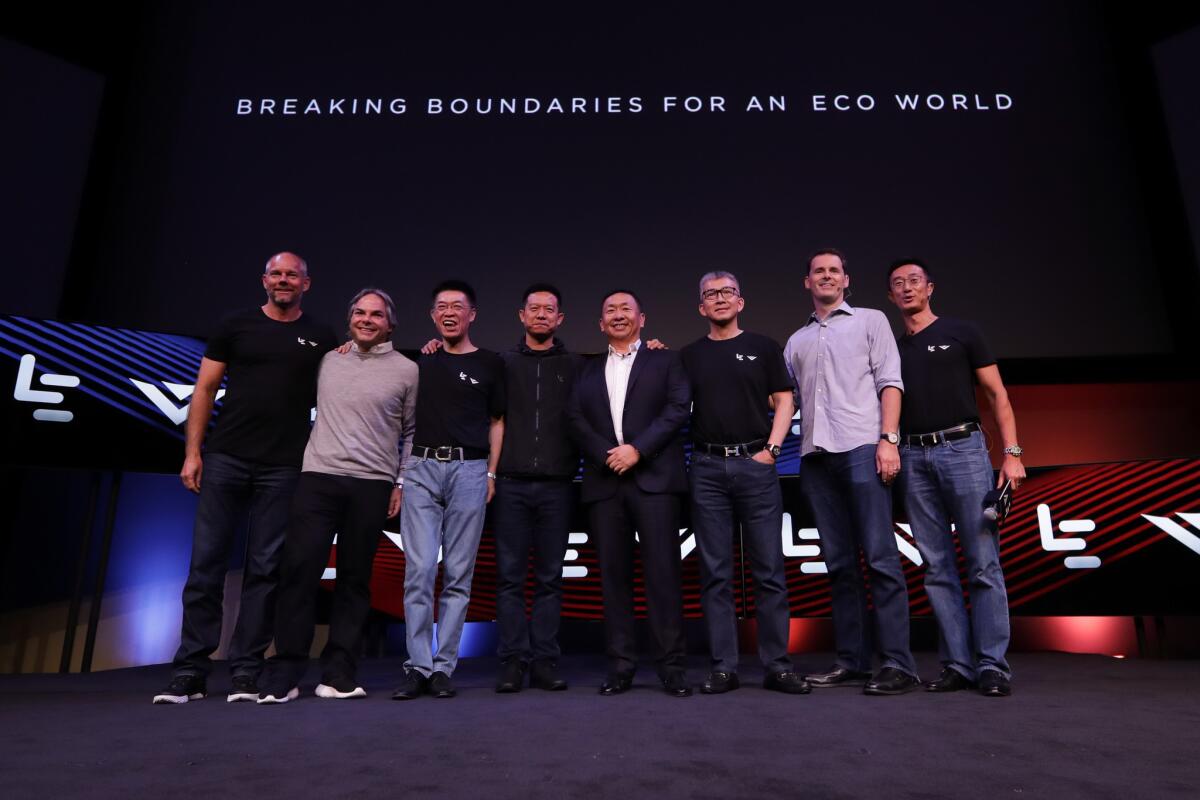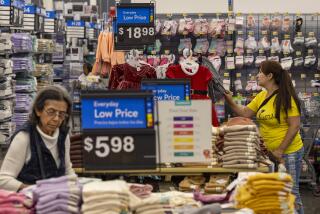The key to Vizio founder William Wang’s $2-billion business? Trust in his employees

- Share via
William Wang, founder and chairman of TV maker Vizio Inc., had receded into the background at the Irvine company in recent years. So even though it was him at a media event announcing LeEco’s acquisition of Vizio for $2 billion last month, he quickly turned the attention to a group seated directly in front of the stage.
The CEO clasped his hands together and beamed like a proud parent as he looked out at the executives who he said were among the company’s “true heroes.”
Wang called out his disciplined chief operating officer, his chief technologist who took three years to recruit, and his hard-working sales leader who had been connected to him since she was 18 years old. Wang said he had the industry’s best forecaster, the creator of the world’s “biggest Excel spreadsheet.” And he talked up the gains from Vizio’s external auditor and a former client joining the company.
The cadre of senior executives is among the top reasons Wang believes Vizio has become the nation’s second best-selling TV brand, behind only Samsung. With the help of ambitious Chinese tech and media company LeEco, it could conquer much more of the globe. Wang plans to move on to a new venture when the acquisition closes, but he says the company’s success has more to do with his team than himself.
“We empower people to make decisions and make decisions together instead of me calling every single shot,” Wang said.
He crystallized that dictum several years ago when he handed deputies batons. Like orchestra conductors, he wanted them to arrange operations as they saw fit.
“The result speaks for itself,” Wang said.
The heavy emphasis on delegation derived from Wang’s previous start-up, a computer monitor seller. The Taiwanese immigrant, who says he learned English as a teenager watching TV, founded the business in 1990 at age 26 after working in tech support for a similar company. Life went well until monitors became a commodity and prices fell. Rivals grew efficient; Wang stuck to selling pricey tech. He recalled being a naive micromanager.
“I was too young and without experience to be a leader of a large enterprise,” he said.
With Vizio, which Wang started in 2002 seeking to undercut TV manufacturers with exorbitant profit margins, he initially hovered over many decisions. Supported by a bachelor’s degree in electrical engineering from USC and just a few employees, he put in 19-hour days and attended to even small design details (“The key should be here or there or this picture is not sharp enough,” Wang said.).
He also tapped his old contacts to outsource manufacturing and attract investment from the suppliers. The set-up, which includes not requiring manufacturers to adhere to labor and environmental standards, allows Vizio to keep costs downs, compared with rivals who make their own sets.
Other start-up cash came from venture capital firm WI Harper Group, a co-founder who later left the company, and personal funds after Wang and his wife, Sakura, took out a loan against their house.
Wang’s influence led to a call center in South Dakota, the home of his former client, the once high-flying computer brand Gateway. Having worked in customer support as his first job out of college, he knew having support staff under the company’s wing would quickly identify issues with products and help keep customers happy.
But as the company scooped up market share, Wang started to leave decisions to the rest of the management team.
Wang tasked Chief Administrative Officer Rob Brinkman, who joined in 2007, with expanding and improving customer service through new software and standards. Vizio now prides itself on being able to answer emails in less than an hour, compared with what it said was an industry standard of more than a day.
President and Chief Operating Officer Ben Wong and sales chief Laynie Newsome work in concert to match component supplies with sales at stores so that Vizio doesn’t spend needlessly on parts with fickle prices or hold too much depreciating inventory.
“Our competitors don’t practice that and they lost a lot of money the last couple of years because they can’t keep the inventory clean,” Wang said.
Not every decision has panned out. Vizio introduced tablets about five years ago, but sales started to fall for the company and other tabletmakers as consumer preferences changed. Wang credits the team for adapting though, launching this year a way to stream content to its TVs from a wide range of tablets.
Wang describes the decision to sell as one he hesitated over because he didn’t want to lose control. He’ll most likely come out close to a billionaire, and he said his employees deserved the fortune they’ll get. They hadn’t ever been able to cash out shares.
LeEco, a multifaceted tech and media conglomerate founded by Chinese billionaire Jia Yueting, had been persistent with escalating offers over three years. A 100% acquisition and all cash — it was “an offer I can’t say no to,” Wang said.
Now, the question is whether Wang’s mantra of delegation works again. He’s spinning out from Vizio a viewer-tracking business, Inscape. Wang says San Francisco-based Inscape will modernize TV advertising, though he’s coy about plans. He declined to say whether he’s bringing over executives from Vizio or shaking up Inscape’s existing leadership.
Vizio has previously said Inscape technology identifies what viewers are watching on their TV, information that would allow Vizio or third parties to serve tailored videos and ads more likely to interest users.
“They’re attacking a problem worth solving,” but one that many others are studying, said Peter Horan, the former CEO of About.com who now advises media start-ups.
Companies such as Toyota, Dunkin Donuts and H&M have already worked with Gracenote, the largest player in the TV content recognition and new-wave ad space. Like Gracenote, Inscape could provide viewers interactive experiences such as polling and informational overlays while selling manufacturers TV usage data for six-figure fees, media experts said. The key will be amassing a large user base of potential ad viewers to make it worthwhile for advertisers to participate.
Wang says he’s already achieved the American dream, coming out a victorious David in his mind after taking on Goliaths such as Sony, Panasonic and Sharp. His management team survived shortages and surpluses, price increases and decreases, patent trolls and the Great Recession, he said.
To come out on top again, he’ll count on another team.
“I have a dream, I have a vision,” Wang said. “But without great employees, it’ll become nothing.”
Twitter: @peard33







